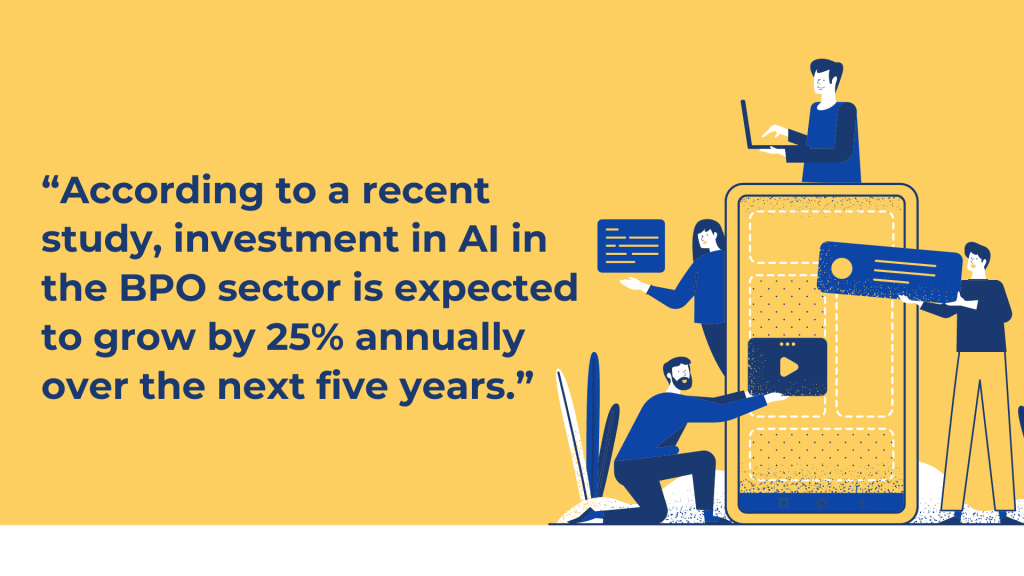Emerging BPO Technologies are revolutionising the Business Process Outsourcing industry, integrating advanced tools like Artificial Intelligence, Machine Learning, and Cloud Computing. This transformation is a significant leap in operational efficiency and investment strategies for BPO companies.
The role of Automation in this sector cannot be understated. It streamlines processes, enhancing the speed and accuracy of outsourced tasks. Similarly, Artificial Intelligence and Machine Learning are pivotal in decision-making, data analysis, and customer service improvement. These technologies also contribute to Cybersecurity, ensuring data protection in the outsourcing arena.
Digital Transformation is another key aspect, with Cloud Computing at its core. It allows BPOs to offer scalable, flexible, and secure services. This shift not only supports Operational Efficiency but also paves the way for adopting other technologies like Virtual Reality for training and Environmental Technology for sustainable practices.
The Rise of Artificial Intelligence in BPO
Emerging BPO Technologies are revolutionising the Business Process Outsourcing (BPO) industry, spearheading a new era of customer service and back-office operations. Artificial Intelligence (AI) stands at the forefront of this transformation, offering innovative solutions that enhance operational efficiency and redefine the dynamics of outsourcing.
AI and Customer Service in BPO
AI technologies are drastically altering the landscape of customer service in BPO. Chatbots and virtual assistants, powered by AI, are now capable of handling complex customer queries with efficiency and precision. For instance, a leading telecommunications company implemented an AI-driven chat system that reduced response time by 40% and improved customer satisfaction rates significantly.
Back-Office Transformation through AI
In back-office operations, AI applications like machine learning algorithms are optimizing data processing tasks. A financial services firm utilized machine learning to automate its data entry process, achieving a 50% reduction in processing time and a significant decrease in errors.
Digital Transformation and Cloud Computing
Digital transformation in BPO, facilitated by AI and cloud computing, is creating more agile and scalable solutions. Cloud-based AI systems offer the flexibility to scale operations up or down based on demand, ensuring cost-effective and efficient service delivery.
Cybersecurity and AI
With the integration of AI in BPO, cybersecurity has become a top priority. AI-driven security systems can predict and prevent cyber threats more effectively, safeguarding sensitive data. A healthcare BPO adopted an AI-based security protocol that identified and neutralized threats 30% faster than traditional methods.

Investment in AI and Market Trends
The investment in AI technologies in BPO is growing rapidly, driven by market trends that demand more sophisticated, technology-driven solutions. According to a recent study, investment in AI in the BPO sector is expected to grow by 25% annually over the next five years.
Machine Learning and Operational Efficiency
Machine learning, a subset of AI, is pivotal in enhancing operational efficiency in BPO. By automating routine tasks, machine learning frees up human resources for more complex and strategic activities, thereby improving overall productivity.
Environmental Technology in BPO
AI also plays a significant role in promoting environmental technology in BPO. Automated systems optimize resource use, reducing the environmental footprint of BPO operations. An analysis of energy consumption in BPOs showed a 20% reduction after implementing AI-based environmental controls.
Cloud Computing: A Game Changer for BPOs
Emerging BPO Technologies are revolutionizing the landscape of Business Process Outsourcing (BPO). At the forefront of this transformation is cloud computing, a technology that significantly enhances scalability and efficiency in BPO operations. The integration of cloud technology into BPOs is not just a trend; it’s a pivotal shift in how outsourcing services are delivered and managed.
Scalability Enhanced by Cloud Computing
In the realm of BPO, scalability is key. Cloud computing allows BPO firms to easily scale up or down based on client needs, a critical factor in managing varying workloads. This flexibility is essential in adapting to market trends and client demands. Additionally, cloud platforms facilitate the seamless integration of Emerging Technologies for BPO Efficiency, such as AI and machine learning, further boosting scalability.
Efficiency Through Automation and AI
Automation and Artificial Intelligence (AI) are significant components of Emerging BPO Technologies. Cloud computing provides the necessary infrastructure to implement these technologies effectively. AI in BPO Services leads to more efficient processes, reducing manual labor and minimizing errors. This integration not only improves operational efficiency but also enables BPOs to offer more advanced services, such as data analysis and customer relationship management.
Cybersecurity in the Cloud
With the adoption of cloud computing, cybersecurity has become a paramount concern. Emerging BPO Technologies must include robust cybersecurity measures to protect sensitive data. Cloud providers often offer advanced security features, ensuring that BPOs can maintain the integrity and confidentiality of client information. This is a critical aspect of Digital Transformation in BPO, where trust and security are fundamental.
Investment in Cloud Technology
Investing in cloud technology is a strategic move for BPOs aiming for Digital Transformation. It’s not just about adopting new technologies but also about investing in training and development. BPO Tech Investment in cloud platforms ensures a future-proof business model, capable of adapting to Next-Gen BPO Solutions and market demands.
Environmental and Workforce Implications
Cloud computing in BPOs also aligns with Environmental Technology initiatives. By reducing the need for physical infrastructure, it minimizes the carbon footprint of BPO operations. Moreover, it introduces flexibility in Workforce Management, enabling remote work and diverse talent acquisition, which is essential in today’s globalized business environment.
Market Trends and Cost Reduction
Adopting cloud technology reflects the current Market Trends in BPO. It’s a move towards more efficient, scalable, and secure operations. This shift is not only about staying competitive but also about reducing operational costs. Cloud platforms can help BPOs achieve significant Cost Reduction, primarily through decreased infrastructure expenses and increased process efficiency.
Automation and Robotic Process Automation (RPA)
The integration of Automation and Robotic Process Automation (RPA) in Business Process Outsourcing (BPO) represents a significant leap in operational efficiency. RPA, a facet of emerging BPO technologies, is redefining how businesses approach process improvement. By automating repetitive tasks, RPA allows for a more efficient allocation of human resources, leading to increased productivity and cost reduction.
The Role of RPA in Digital Transformation and BPO Innovation Trends
In the landscape of digital transformation, RPA serves as a cornerstone in the BPO industry. It is a prime example of how technological advancements in BPO are streamlining operations. With RPA, tasks that were once manual and time-consuming are now automated, leading to a transformation in workforce management and operational efficiency. This shift is a critical aspect of the business process outsourcing future.
Benefits of RPA in BPO Services
- Cost Reduction: RPA technologies reduce operational costs by automating routine tasks, leading to significant savings.
- Increased Accuracy: With machine learning capabilities, RPA reduces errors associated with human intervention.
- Enhanced Cybersecurity: By minimizing human intervention, RPA also reduces the risk of data breaches, aligning with contemporary cybersecurity measures.
- Operational Efficiency: Automation ensures faster processing times, contributing to the overall efficiency of BPO operations.
Challenges of Integrating RPA in BPO
While the benefits are substantial, the integration of RPA in BPO operations is not without its challenges. Key among them is the initial investment required for implementing these technologies. There is also a learning curve involved in adapting to these new systems, necessitating training and development for existing staff.
RPA and AI in BPO Services: A Synergistic Relationship
Artificial Intelligence (AI) and RPA are converging to create smarter BPO solutions. AI in BPO services enhances RPA by enabling systems to learn and adapt over time, leading to continuous improvement in process efficiency. This integration marks a significant development in BPO automation technologies, paving the way for more advanced, AI-driven BPO services.
Cloud Computing and Virtual Reality in BPO
Cloud computing for BPO has emerged as a critical technology, offering scalable and flexible solutions for data storage and access. Meanwhile, virtual reality in BPO is beginning to take shape, offering immersive training and simulation experiences that enhance workforce skills and management.
Market Trends and Environmental Technology in BPO
Current market trends indicate a strong movement towards environmental technology in BPO. This shift not only supports sustainable practices but also aligns with the growing emphasis on corporate social responsibility. Emerging BPO markets are increasingly adopting these technologies, recognizing their potential for long-term cost savings and public goodwill.
Blockchain Technology in BPO
Blockchain technology, a cornerstone of emerging BPO technologies, is revolutionizing Business Process Outsourcing (BPO) by enhancing secure data management and optimizing contract management and compliance. This integration marks a significant stride in the digital transformation journey of the BPO sector, leveraging automation and artificial intelligence to redefine operational efficiency.
Blockchain in Secure Data Management
In the realm of BPO, where data security is paramount, blockchain technology stands out for its robust cybersecurity features. It offers an immutable ledger system, ensuring the integrity and traceability of data transactions. This is particularly crucial in fields like finance and healthcare, where data sensitivity is high. By integrating blockchain, BPO companies are not only reinforcing their data protection measures but also aligning with the latest market trends in cybersecurity.
Contract Management and Compliance
Blockchain’s application in contract management transforms traditional processes into more efficient, transparent systems. Smart contracts, automated agreements that execute themselves when predefined conditions are met, are a hallmark of this transformation. They reduce the need for intermediaries, thereby streamlining operations and contributing to cost reduction. In compliance, blockchain’s transparent and unalterable record-keeping aids in adhering to regulatory standards, which is especially beneficial for companies dealing with international outsourcing contracts.
The Synergy with Other Technologies
The fusion of blockchain with other BPO technologies like AI, machine learning, and cloud computing is fostering a new wave of innovation. AI and machine learning algorithms, when combined with blockchain, can predict market trends and enhance decision-making processes. Cloud computing facilitates the scalability of blockchain solutions, making them more accessible to various sectors within the BPO industry. This synergy is not only driving operational efficiency but also paving the way for next-gen BPO solutions.
Investment and Market Trends
Investments in blockchain technology within the BPO sector are indicative of its potential. Companies are increasingly recognizing the value of integrating emerging BPO technologies to stay competitive. The trend towards digital transformation, bolstered by blockchain, is reshaping the landscape of BPO services, leading to smarter, more efficient, and environmentally friendly solutions.
Workforce Management and Training
Adopting blockchain in BPO also impacts workforce management. Training programs focused on emerging technologies like blockchain, AI, and machine learning are becoming essential to equip the workforce with the necessary skills. This upskilling is a critical component in ensuring the seamless integration of new technologies into BPO operations.
Conclusion
Emerging BPO Technologies are revolutionizing Business Process Outsourcing, propelling it into a new era of efficiency and innovation. Key drivers of this transformative journey include Automation, Artificial Intelligence, and Digital Transformation. These technologies are not just buzzwords; they are the pillars supporting the BPO industry’s evolution.
Automation, a cornerstone of Emerging BPO Technologies, streamlines repetitive tasks, enhancing Operational Efficiency and allowing BPO firms to focus on more strategic initiatives. Artificial Intelligence takes this a step further by introducing intelligent decision-making capabilities. AI in BPO Services is no longer a futuristic concept but a present-day reality, driving improved customer experiences and decision-making processes.
The integration of Cloud Computing for BPO has opened doors to unprecedented scalability and flexibility. It enables BPO firms to manage vast data volumes and complex processes efficiently, ensuring robust Cybersecurity measures are in place to protect sensitive data.
Machine Learning in BPO is another critical component. It’s not just about data processing; it’s about learning from data to predict trends, enhance services, and optimize operations. This leads to significant Cost Reduction and operational improvements.
Emerging BPO Technologies also encompass Environmental Technology, aligning BPO operations with sustainability goals. This aspect resonates with the growing global emphasis on environmental responsibility.
FAQs
What are the latest technologies in BPO?
The latest technologies in Business Process Outsourcing (BPO) include Artificial Intelligence (AI), Machine Learning (ML), Robotic Process Automation (RPA), Cloud Computing, Big Data Analytics, and the Internet of Things (IoT). These technologies are transforming BPO services by enabling more efficient, accurate, and cost-effective processes.
How is AI impacting BPO services?
AI is significantly impacting BPO services by automating complex tasks, improving customer service through chatbots and virtual assistants, enhancing data processing capabilities, and providing insights through advanced analytics. This leads to increased efficiency, better decision-making, and enhanced customer experiences.
What is the future of BPO with technological advancements?
The future of BPO with technological advancements is poised to be more automated, efficient, and data-driven. Technologies like AI, ML, RPA, and Cloud Computing will enable BPOs to offer more sophisticated services, including predictive analytics and intelligent automation, leading to higher value-addition and strategic partnerships with clients.
How does technology improve BPO efficiency?
Technology improves BPO efficiency by automating routine tasks with RPA, enhancing decision-making with AI and ML, providing scalable and flexible solutions through cloud computing, and enabling better data management and analytics. These advancements lead to faster turnaround times, reduced errors, and cost savings.
What are the emerging trends in the BPO industry?
Emerging trends in the BPO industry include the increasing adoption of AI and ML for process automation and decision support, the shift towards cloud-based BPO services for scalability and flexibility, a greater focus on cybersecurity, and the integration of IoT for enhanced data collection and analysis.
How can BPO benefit from cloud computing?
BPO can benefit from cloud computing by gaining scalability, flexibility, and cost-efficiency. Cloud platforms enable BPOs to easily adjust resources to meet varying client demands, offer remote and global services, reduce infrastructure costs, and improve collaboration and data accessibility.
What role does cybersecurity play in BPO?
Cybersecurity plays a crucial role in BPO by protecting sensitive client data, maintaining compliance with regulations, and ensuring business continuity. Effective cybersecurity measures are essential to build trust with clients, prevent data breaches, and mitigate risks associated with cyber threats.
How is machine learning used in BPO?
Machine learning is used in BPO for process automation, predictive analytics, and enhancing customer experiences. ML algorithms can analyze large data sets to identify patterns, automate decision-making processes, optimize workflows, and provide personalized customer interactions.
What are the cost reduction technologies in BPO?
Cost reduction technologies in BPO include Robotic Process Automation for automating routine tasks, cloud computing for reducing infrastructure costs, AI and ML for efficient data processing and decision-making, and VoIP (Voice over Internet Protocol) technologies for cost-effective communication.
How does technology affect BPO workforce management?
Technology affects BPO workforce management by enabling remote work through cloud platforms, automating routine tasks with AI and RPA, requiring new skill sets for handling advanced technologies, and facilitating better workforce analytics and planning through data-driven tools.






